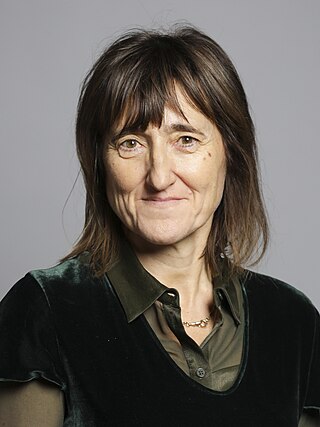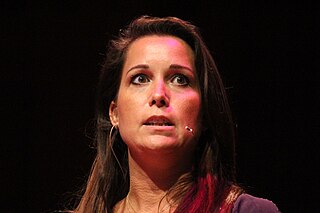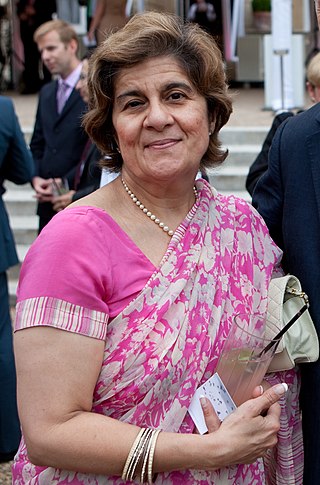
James Philip Knight, Baron Knight of Weymouth, is a British politician who served as Minister for the South West and Minister of State for Employment and Welfare Reform from 2009 to 2010. A member of the Labour Party and Co-operative Party, he was Member of Parliament (MP) for South Dorset from 2001 to 2010.

Helen Patricia Sharman, CMG, OBE, HonFRSC is a British chemist and astronaut who became the first British person, first Western European woman and first privately funded woman in space, as well as the first woman to visit the Mir space station, in May 1991.

TED Conferences, LLC is an American-Canadian non-profit media organization that posts international talks online for free distribution under the slogan "ideas worth spreading". It was founded by Richard Saul Wurman and Harry Marks in February 1984 as a technology conference, in which Mickey Schulhof gave a demo of the compact disc that was invented in October 1982. Its main conference has been held annually since 1990. It covers almost all topics—from science to business to global issues—in more than 100 languages.

Sheffield DocFest, is an international documentary festival and Industry Marketplace held annually in Sheffield, England.

Margaret Elizabeth Philbin OBE is an English radio and television presenter whose credits include Tomorrow's World, Multi-Coloured Swap Shop and latterly Bang Goes the Theory.
Femi Oyeniran is a Nigerian-British actor and director who started his career in the cult classic Kidulthood, playing the role of "Moony" in 2006. It was followed by the 2008 sequel Adulthood. His first feature film as a director "It's A Lot" was released theatrically by Kaleidoscope Home Entertainment in 2013. Oyeniran sold his second movie The Intent to Netflix for a worldwide release; it appeared on the platform on 15 May 2017. The film had already peaked at number 3 on the iTunes Movie Chart and opened to sold out cinemas. It was funded, shot and distributed completely independently.

Beeban Tania Kidron, Baroness Kidron,, is an advocate for children's rights in the digital world. She has played a determinative role in establishing standards for online safety and privacy across the world.
The Online Centres Network is a UK-based network which helps communities tackle social and digital exclusion.

The Local Democracy, Economic Development and Construction Act 2009, or LDEDCA, is an act of the Parliament of the United Kingdom.
Get Online Week is an annual campaign that takes place in the UK and Europe.

Yuri Borisovich (Bentsionovich) Milner is a Soviet-born Israeli entrepreneur, investor, physicist and scientist. He is a co-founder and former chairperson of internet company Mail.Ru Group, and a founder of investment firm DST Global. Through DST Global, Milner is an investor in Byju's, Facebook, Wish, and many other enterprises.

Helen Storey, MBE, RDI, FRSA is a British artist and designer living and working in London. She is professor of fashion science at the University of the Arts, London and co-director of The Helen Storey Foundation.

The Cybersmile Foundation is an international nonprofit organization committed to tackling all forms of cyberbullying and digital abuse. They promote kindness, diversity, and inclusion through professional support services, education programs, awareness campaigns and corporate partnerships.
Good Things Foundation is a registered charity based in the UK, the objective of which is to make the benefits of digital technology more accessible. It manages the Online Centres Network, the Learn My Way learning platform, and the National Databank.

Emma Elizabeth Mulqueeny is a British technologist and educator. She is best known for co-founding Rewired State and Young Rewired State, which provided a community and events for technically gifted young people. She has campaigned for programming to be taught from an early age in UK schools to encourage wider uptake and increased diversity in the tech sector.
The World Forum for Democracy is a gathering each November in Strasbourg, France to debate the complex challenges facing democracies today and foster democratic innovation. The Forum is hosted by the Council of Europe and brings together members of civil society, political leaders and representatives of business, academia, media and professional groups. Past editions have revolved around themes such as "Bridging the gap: democracy between old models and new realities", "Re-wiring Democracy: connecting institutions and citizens in the digital age" and "From participation to influence: can youth revitalise democracy?".

Nusrat Mehboob Lilani, known as Pinky Lilani, is an author, motivational speaker, food expert and women's advocate. She is the founder and chair of several awards recognising influential women and leaders, including the annual Women of the Future Awards and the Asian Women of Achievement Awards.

Helen Zerlina Margetts, is Professor of Internet and Society at the Oxford Internet Institute (OII), University of Oxford and from 2011 to 2018 was Director of the OII. She is currently Director of the Public Policy Programme at The Alan Turing Institute. She is a political scientist specialising in digital era governance and politics, and has published over a hundred books, journal articles and research reports in this field.

WebRoots Democracy was a London-based think tank focused on progressive and inclusive technology policy. It was founded in May 2014 and closed in November 2020.
Lee Elliot Major is Professor of Social Mobility at the University of Exeter, Britain's first professor in the field. His work is dedicated to improving the prospects of disadvantaged young people.













